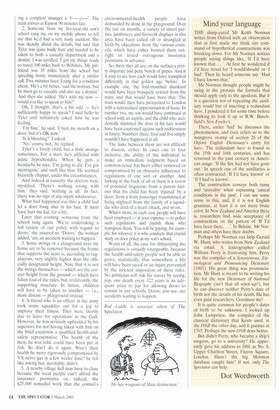Mind your language
THE sharp-eared Mr Keith Norman writes from Oxford with an observation that at first made me think our command of hypothetical constructions was breaking down. For Mr Norman notices people saying things like, 'If I'd have known that.. . '. At first he wondered if I'd here stood for 'I would/should' or 'I had'. Then he heard someone say, 'Had I have known that.'
Mr Norman thought people might be using in the protasis the formula that should apply only to the apodosis. But it is a question not of repeating the auxiliary would but of inserting a redundant have. I pondered it for some time before thinking to look it up in R.W. Burchfield's New Fowler's.
There, under 'had' he discusses the phenomenon, and even refers us to the mangrove swamp of section 26 of the Oxford English Dictionary's entry for have. The redundant have is found in the 15th and 16th centuries, and has returned in the past century in American usage: 'If the fire had not have gone Out.' In speech one of the auxiliaries is often contracted: 'If I'd have known' or a I had've known'.
The construction conveys both tense and 'unreality' when expressing 'unreal conditions in the past'. I can see some sense in this, and, if it is not English grammar, at least it is not mere brute error. In New Zealand and America there is, researchers find, wide acceptance of constructions on the pattern of 'If I'd have been there... '. In Britain, Mr Norman and others have their doubts.
Perhaps Mr Norman can help Gerald W. Hunt, who writes from New Zealand via email. A lexicographer called William Perry is frustrating him. Perry was the compiler of a Synonymous, Etymological and Pronouncing Dictionary (1801). His great thing was pronunciation. Mr Hunt is meant to be writing his life for the new Dictionary of National Biography (isn't that all sewn up?), but he can discover neither Perry's date of birth nor the details of his death. He has even paid researchers. Goodness me!
It is quite common for people's dates of birth to be unknown. I looked up John Lempriere, the compiler of the classical dictionary that Keats used, in the DNB the other day, and it guesses at 1765. Perhaps the new DNB does better.
But didn't Perry, who became a ship's surgeon, go to a university? He apparently gave his address in 1801 as No. 8, Upper Charlton Street, Fitzroy Square, London. Hasn't the big Mormon database caught him? If not, only The Spectator can help.
Dot Wordsworth


















































































 Previous page
Previous page